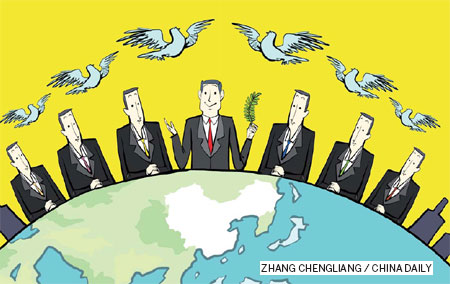It's time to engage emerging neighbors
Updated: 2013-06-11 14:19
By Yifan Hu (China Daily)
|
||||||||


But china needs to be careful about how it plays its economic cards, balances relations
China is in the process of a modest recovery, with lower growth bottoming out in the third quarter of last year. Over the next decade, growth is likely to continue to be boosted by an investment boom centered on infrastructure, bringing about another golden decade.
However, in addition to sustaining the quality and the pace of growth in the short term, there is increasing urgency to implement structural reform in many areas to keep China competitive; it is particularly vital for China to switch to a domestic demand-driven model of growth. Any significant external conflicts may halt the progress of these reforms, and significantly compromise China's future.
What China really needs to do is make the most of its economic power to deal with multilateral relationships in the region to bring about a favorable new equilibrium.
China has become an economic and political powerhouse even as developed countries struggle to regain growth following the global financial crisis and faced with the European debt crisis.
China, still developing its economy, has been abruptly thrust into the spotlight as a superpower, and this rapid rise has raised concerns in Western countries as well as among China's neighbors.
Given those concerns, and with China's increasing interests abroad, it has become increasingly urgent for it to adopt a new foreign affairs strategy befitting its new role.
China's policy of non-intervention has been right for the times, and with its status as an emerging economy, non-intervention has allowed it to remain neutral on most issues, avoiding damaging relations with anyone and meaning it has been able to save on time and energy that might otherwise have been wasted.
However, this modus operandi is unlikely to continue to work as China expands its global ties and interests. The old approach will become increasingly anachronistic for a country expected to weigh in on important international issues.
While China needs to adhere to existing bottom-line issues, it also needs increasingly to become more pragmatic as its ascension continues over the coming decades.
Even with the weight of military force, economic power will play an increasingly important role in international affairs. Tackling unemployment and boosting growth have become the touchstones of success for politicians, and countries that can help drive global growth with all the positive effects that this entails will be the kings of the game.
China has vast potential for further growth, meaning it will be able to play its economic cards when the time best suits it.
Its emerging neighbors are catching up, just as China was doing 20-30 years ago. These countries have often been seen as China's competitors with low-value added manufacturing products, but there is increasing room for cooperation between them and China when it begins to move up the value added ladder.
The emerging neighbors are becoming increasingly important for China, as shown by their increasing share of trade in recent years.
The relationships between China and these neighbors are important on several levels. First, intra-country trade in the region has remained strong despite the global crisis. Regional trade agreements could provide both sides with more access to export markets.
The ASEAN-China free trade agreement that came into force in 2010 is an example. It has helped lower tariffs between China and ASEAN countries by more than 90 percent.
Reducing tariffs and removing trade barriers are the best ways of developing trade relations in the region. This will also divert trade from the US and other countries, benefiting ASEAN members and China. Such agreements would: bring increased trade between ASEAN and China; promote intra-industry trade, specialization and concentration of activities, and transfers of technology; and result in higher productivity.
Second, there is room for working together in production and investment when China starts to move up the value-added ladder in a transition toward a domestic-consumption oriented economy.
Low value-added production will move to the emerging neighbors sooner or later, so instead of letting it happen spontaneously at the private level, China should pave the way for an orderly transfer of some production capacity to emerging neighbors that have good relations with China.
This model could be particularly effective for China because it has an abundance of resources and a huge market, so can offer and control both upstream and downstream flows. Together with matching investment, this orderly transfer would not only help local economies develop, but also create an economic relationship on China, and motivate their willingness to keep strong political ties with China.
Smooth relationships with neighbors could provide China with more freedom to focus on its own growth and on the global picture. To encourage countries to improve ties with China, it could start this process with friendly neighbors such as Thailand, Nepal, and Pakistan, and then extend the process to strategically important neighboring economies.
Third, now is the time for China to become a regional leader as it will help to neutralize the containment strategy of the US. Similar to strong ties of North American countries under US leadership, China could benefit greatly by playing a more active leadership role in dealing with regional affairs and promoting regional growth.
Finally, China can further improve relations with neighboring emerging countries by accelerating the pace of yuan internationalization, especially for use in cross-border trade. This process is already in motion, as ASEAN countries among others are able to settle portions of trade using the yuan.
China has also signed currency swap agreements with several neighboring countries. By accelerating the process, China can strengthen the yuan's position, and aim to have it become the reserve currency for the regional bloc, thus extending ties and expanding its influence.
Apart from relationships between China and Japan, and China and its emerging neighbors, the relationships between China and the US, China and Europe and China and Russia will be of utmost strategic importance over the coming decades.
Communication is equally important in international affairs, especially for a rising power like China facing great challenges on how to communicate its intentions to other countries. As a country grows in power at an alarming pace, it is natural for the established powers and its neighbors to feel some apprehensive.
At the same time, China's record of often having been attacked whenever it became weak motivates it to continue to build up its strength. That creates distrust, which is also fanned by differences of culture and politics.
Envy is also at play. The financial crisis has dragged down major developed economies such as Europe even as China has maintained its strong growth, and there are many who are only too willing to use China as a whipping boy.
Of course, distrust breeds distrust, so the issues that breed it need to be tackled head on, which is where effective communication becomes critical. Improving China's communication strategy, particularly by advocating the school of thought of complex interdependence and re-emphasizing China's peaceful history, would go a long way toward smoothing its transition to superpower status.
China would benefit from improving communication to promote cooperation and diplomacy through a variety of methods, official and non-official, including promoting cultural bridges to increase trust; establishing open, smooth and regular official communication platforms; and encouraging multi-layer grassroots communication channels.
The author is head of research and chief economist of Haitong International Securities based in Hong Kong. The views do not necessarily reflect those of China Daily.
(China Daily USA 06/11/2013 page13)

 Michelle lays roses at site along Berlin Wall
Michelle lays roses at site along Berlin Wall
 Historic space lecture in Tiangong-1 commences
Historic space lecture in Tiangong-1 commences
 'Sopranos' Star James Gandolfini dead at 51
'Sopranos' Star James Gandolfini dead at 51
 UN: Number of refugees hits 18-year high
UN: Number of refugees hits 18-year high
 Slide: Jet exercises from aircraft carrier
Slide: Jet exercises from aircraft carrier
 Talks establish fishery hotline
Talks establish fishery hotline
 Foreign buyers eye Chinese drones
Foreign buyers eye Chinese drones
 UN chief hails China's peacekeepers
UN chief hails China's peacekeepers
Most Viewed
Editor's Picks

|

|

|

|

|

|
Today's Top News
Shenzhou X astronaut gives lecture today
US told to reassess duties on Chinese paper
Chinese seek greater share of satellite market
Russia rejects Obama's nuke cut proposal
US immigration bill sees Senate breakthrough
Brazilian cities revoke fare hikes
Moody's warns on China's local govt debt
Air quality in major cities drops in May
US Weekly

|

|







